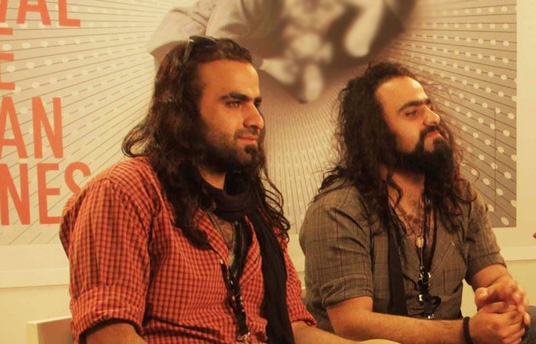People in Film: Tarzan and Arab
May 28, 2013

Mohammed and Ahmad Abu Nasser’s short film ‘Condom Lead’ was presented in competition at the Cannes Film Festival last week. DFI Outreach Manager Reem Saleh met with the directors – better known as Tarzan and Arab – to chat about the project.
Reem Saleh: How would you describe your feelings on finding out that ‘Condom Lead’ was selected for the competition at Cannes?
Arab: It was amazing. It is every filmmaker’s dream just to attend Cannes, let alone participate in the official competition. Cannes is one of the most prestigious festivals in the world, and we’ve been dreaming about reaching this level.
RS: Tell us more about the film.
Tarzan: ‘Condom Lead’ is a film parody of Operation Cast Lead, the Israeli-led first war in the Gaza Strip in 2008. It was the fiercest military attack of all time. Our film is not about the war on Gaza, but rather about wars everywhere, since they all have the same consequences. We tried to work on a general level. The condom is used here as a symbol of protection; sometimes its purpose is to indicate the search for love and security, which is so severely affected by wars. We might say that the message behind the film is simply, Stop waging wars and let us live in peace.
Arab: Blowing up the condom was the man’s way to let go of his frustration, since he was trying in vain to be intimate with his wife. They live in fear and extreme conditions, and they are trying to find a way to overcome all of that.
RS: What inspired you in making this film?
Arab: It is a symbolic attempt to shed light on the surrealism of life, as well as war and cinema. The man and his wife represent every man and woman living under the same roof. The child represents all children living in extreme conditions. The condom represents protection and serves to diffuse anger, fear, frustration and despair.
It was intended to be a slow-paced film, with the continuous drone of Israeli spy jets in the background. The slow rhythm engages the audience with the two lead characters, whom we wanted to have very neutral looks. They don’t look like Arabs, not easterners nor westerners. We didn’t want to reflect only on the experiences of Gazans, but rather on the similarities of people’s experiences everywhere.
The colour tones vacillate between warm and cold, to support the events. At the beginning, warm colours dominate; then it gets darker and cold. Finally, everything goes back to normal after the end of war, except the children are now playing with colourless condoms, in contrast with the colourful balloons they used to play with.
RS: The film has a rich cinematic background. Where did you come by this experience?
Tarzan: We studied fine arts and theatre. Cinema is our one and only passion. The film is the final product of the long path we have taken. We’ve watched a lot of films and done lots of reading. We’ve been influenced by French and Russian cinema. Some our great inspirations have been Andrei Tarkovsky, Sergei Parajanov, Béla Tarr and Ingmar Bergman, among many others.
RS: Any plans for a feature-length film any time soon?
Arab: Yes. We are working on a feature film called ‘Casting’. It’s the story of a man who is trying to make a film in a place where people are always busy in the pursuit of daily necessities, keepin them from art and cinema. Maybe it’s not an original idea, but it’s a personal experience, because it also sheds the light on life in Gaza, and the challenges we face in making films.
RS: What is your advice to young aspiring filmmakers like yourselves?
Tarzan: We’re still at the very beginning of a long path. However, I would say: Don’t think too much about the places your film might reach. Just make your art the way you want. Art is no easy task. Be down to earth and have great ambitions, and you will get there.